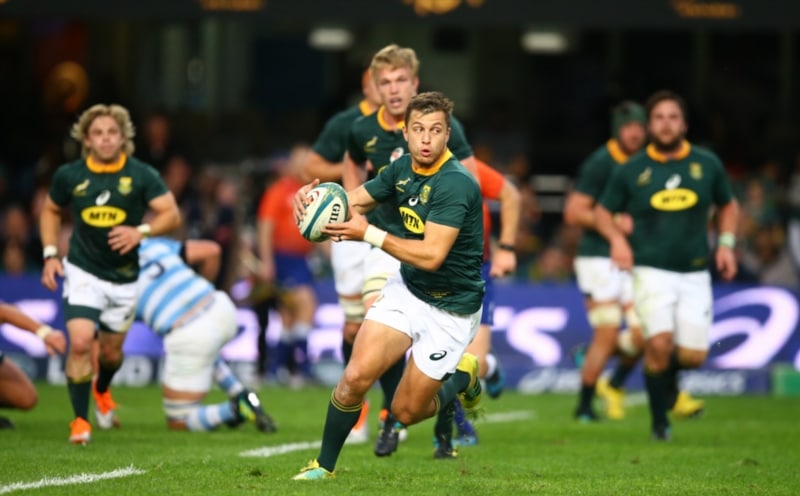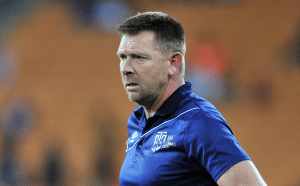The Springboks have to start converting their first-half chances into points if they hope to challenge the All Blacks and other top teams overseas, writes JON CARDINELLI.
Rassie Erasmus’ reaction to the Boks’ 34-21 bonus-point win over Argentina was spot on. He praised the pack for their aggression as well as the leadership for making the necessary tactical adjustments in the second stanza.
It didn’t take the ambitious coach long, though, to put the performance into context and highlight the need for improvement ahead of the more challenging clashes in Argentina and Australasia.
South African rugby fans are desperate to forget about the bad times. We want to believe that the Boks’ worst season in history was 10 years ago instead of two. We want to believe that a three-from-five record is a sign that Erasmus’ side has what it takes to beat the All Blacks.
Erasmus himself burst the bubble at the post-match press conference on Saturday when he reminded reporters that the Boks are hovering at sixth in the World Rugby rankings. They’re not going to knock the All Blacks off top spot overnight. There is a lot of ground that they still need to cover.
There were plenty of positives in the big win at Kings Park. Malcolm Marx, Eben Etzebeth and Francois Louw all made an impact in their first Test appearance of the season. The hosts showed signs of improvement with regard to game management, as well as a willingness to vary their attack.
When was the last time the Boks scored six or more tries? In a pool match against the USA at the 2015 World Cup. When last were they this potent against a tier-one nation? They ran in eight tries against Scotland in Port Elizabeth four years ago.
The Boks played against a full-strength Argentina side on Saturday. On the one hand, it may seem harsh to criticise them for blowing so many scoring chances. On the other, it’s encouraging to note that there is room for improvement after a 34-point, six-try return.
Aphiwe Dyantyi has announced himself as a world-class finisher. Faf de Klerk and Willie le Roux should be commended, too, for their vision and execution in the lead-up to Dyantyi’s tries. The Boks are starting to embrace the fact that the kick can be used as an attacking weapon.
ALSO READ: Dyantyi, Mapimpi dazzle for Boks
The Boks grew stronger as the game progressed. They lost the first half 14-10, and won the second 24-7. They scored four of their six tries in the second stanza.
Again, there are two ways of looking at this. As was the case in the first two Tests against England, the Boks lifted their game after the break to overturn a deficit and emerge victorious. That speaks to the belief in the side, as well as the improved fitness levels.
On the other hand, the Boks appear at a loss to explain their poor starts in Johannesburg, Bloemfontein and most recently, Durban. On Saturday, captain Siya Kolisi admitted that the team had spoken about starting well in the buildup, and were disappointed when they fell behind, yet again, at Kings Park.
Erasmus lamented the missed opportunities – the Bok maul was stopped on several occasions only a few metres from the Argentina tryline, while the hosts made too many handling errors in that 22m area. Handré Pollard missed five of his seven attempts on goal, leaving a total of 11 points on the field.
Those mistakes didn’t cost the Boks the win or the bonus point in Durban. When they come against the Wallabies and All Blacks, however, one missed opportunity, handling error or wayward penalty attempt could mean defeat. Those are the margins when you compete against the best teams.
ALSO READ: Five takeaways from past weekend
The Boks don’t have a good record in Australasia. When you ask the players who have won in that part of the world what it takes to succeed, the answer is always the same. You need to make every opportunity count. You need to be ruthless.
The next game in Mendoza will provide the Boks with some preparation in this regard. Many a Bok side has struggled in Argentina since the inception of the Rugby Championship.
Why? Because they’ve underestimated the challenge of playing in that environment. Because they’ve failed to convert early chances and force the Pumas to chase the game.
The Boks have taken some important strides over the past few months. If they want to make a quantum leap forward – and secure big wins in Argentina and Australasia that mark them as a South African class apart – they must develop the quality that all top sides have: a killer instinct.
ALSO READ: Bok changes expected for Mendoza clash
Photo: Steve Haag/Gallo Images





